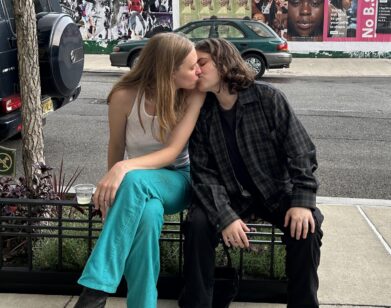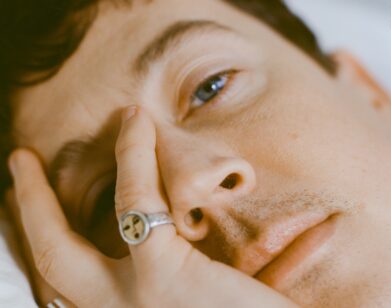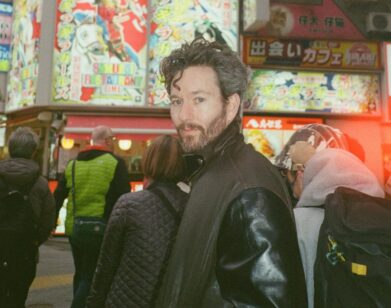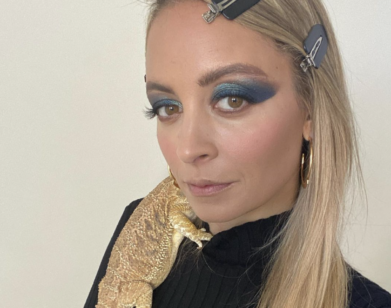The Hilarious Hank Azaria
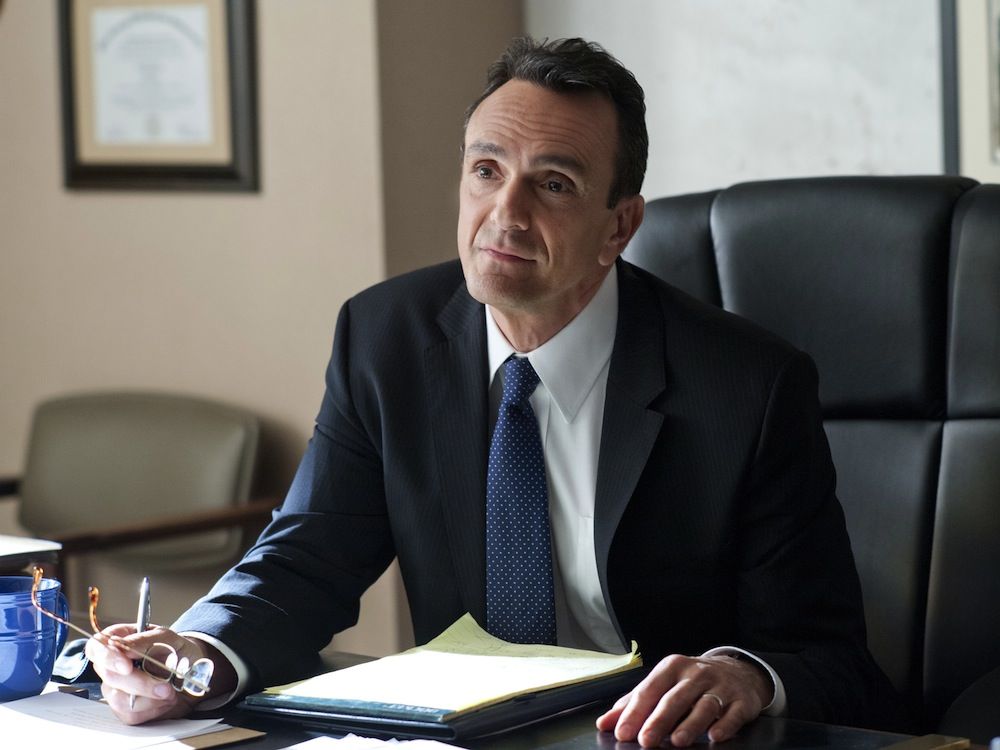
ABOVE: HANK AZARIA ON RAY DONOVAN. PHOTO COURTESY OF SUZANNE TENNER/SHOWTIME.
Over the course of his nearly 30-year career, actor Hank Azaria has definitely made you laugh. It might have been as the voice behind Apu, Moe, Chief Wiggum, Dr. Nick, Snake, and Professor Frink, among others, on The Simpsons, a job he’s held since the show debuted 25 years ago and won three Emmy Awards for. Or perhaps it was his recurring role as David, Phoebe Buffay’s Minsk-dwelling “one who got away” on Friends, which also earned him an Emmy nomination. Or as Agador Spartacus alongside Robin Williams and Nathan Lane in The Birdcage (1996). Or as Kahmunrah, the villain in Ben Stiller’s children’s film Night At the Museum (2009).
Currently, Azaria is playing Los Angeles FBI chief Ed Cochran opposite Liev Schreiber on the second season of Showtime’s drama Ray Donovan. Before the show’s season finale, which airs tonight, Azaria talked to his friend and former co-star actress Kathryn Hahn over the phone.
KATHRYN HAHN: How’s it going?
HANK AZARIA: It’s weird. This is what it must be like to be in KGB Russia where you know somebody’s listening.
HAHN: The whole time. It’s like being back in catholic school—I’m going to fuck up in some way. I am sick as a dog, Hank Azaria.
AZARIA: I’m so sorry. That’s really very trooper-y of you to do this.
HAHN: Are you kidding me? I’m so excited. I’m in a DayQuil haze. We went to the L.A. County Fair yesterday and while we were on a ride called “The Flying Dutchman” I was like, “Oh, I’m breaking a fever.” I was at the top of this thing—you feel like you’re having a free fall drop.
AZARIA: Is that the thing that swings back and forth really high?
HAHN: Yes.
AZARIA: Yeah, I hate that thing.
HAHN: And you’re convinced—because it’s setup in, like, a parking lot in Pomona—”This is going to take off and I’m going to die.” [laughs]
AZARIA: I forgot about your little snort laugh. I just heard it there.
HAHN: Aw. There’s a lot of snot behind it today.
AZARIA: [laughs] It’s really juicy today.
HAHN: When was the last time we saw each other?
AZARIA: When did we last even chat?
HAHN: On a poker trip? How old is your boy now?
AZARIA: Five.
HAHN: Oh my god.
AZARIA: How old are [Hahn’s children] Leonard and Mae? Are they in college basically?
HAHN: They’re totally in college. No, I’m never letting them out of the house. Mae is five. She just started kindergarten. She’s a little too young but she’s doing okay. She’s a little sister so she’s scrappy. And then Leonard is in the second grade. He is going to be eight at the end of the month, which is crazy. I think when we first started seeing each other it was through that amazing birth community. And that awesome doctor, who I actually still see. I love that man.
AZARIA: He is amazing. I interviewed him and his wife for my Fatherhood series. Did you ever see my Fatherhood thing? I should send you the link.
HAHN: Yes, please send me the link. I always remember you were such an unbelievable father.
AZARIA: Well, it’s true…as I blow off my son to talk to you right now.
HAHN: Have you locked him in an adjoining room?
AZARIA: [jokingly] Hal, shut your mouth! I’m on the phone! The boy is great. I really love being the dad and was really terrified to be a dad, which was the whole point of that series.
HAHN: It was something you wanted to investigate before you even knew you were going to be a dad, right?
AZARIA: The whole thing was an insane story. I got obsessed with whether I should have a kid or not. [My girlfriend] Katie [Wright] and I both were very scared of it and ambivalent. I started driving my poker buddies insane every week asking them, “Why do you want to be a dad?” All these father questions. And they were like, “Shut the fuck up. Have a kid or don’t, we really don’t care. Deal the cards.” And I said, “The only thing I’m qualified in life to do is prepare for a role, so if Katie ever got pregnant, I would just follow you morons around to see what you do.” And my buddy Matt Levin said, “That would be a good documentary.” We started shooting that documentary—me, this nervous idiot, asking everyone I could find, “Why do you want to be a dad? Do you love your child more than your wife? Is that why you got married? Is life better or worse?” In the middle of shooting that, my dog of 16 years, Annie, started to die, and the day the dog died was the day we found out we were pregnant. So then the documentary change from, “Why should people have kids?” to “I’m having a kid, please, god, help me.” And then he was born 10 weeks early, and the documentary changed again, because he was two pounds.
HAHN: A little fighter. And that’s all in this series?
AZARIA: That’s all in, like, Episode One. I try to share just enough in the series to give everything context and you can’t do something like this and not make it personal, but it’s really about how do we deal with what we all face as parents.
HAHN: Don’t you feel the older you get it’s getting harder and harder? It’s no joke what sticks—you just know what you say, your words, are going to be ringing in their ears for the rest of their lives.
AZARIA: I was sort of thinking it gets easier and easier but now, listening to you, I’m in a panic again.
HAHN: There was the earthquake last year and my daughter was very panicked, she kept saying, “You have to tell me when it’s going to happen again!” The anxieties of mortality.
AZARIA: Hal’s got a new thing where, when we leave him at school or at camp, he’s fine, but [at home] he has to know where we are in the house at all times. We finally found out from him, he’s scared of bad guys. We had to take him downstairs to the doorman and go, “Look, he’s here all night. He makes sure nobody comes in.” And he really felt better after that. Then he was like, “Yeah, but what if it’s a ghost?” [laughs]
HAHN: “I cannot help you there.”
AZARIA: “Well, ghosts will kill you.”
HAHN: [laughs] I forgot that you’re in New York full time now. When did you first get involved in performing? You always, from the time you were a wee lad, loved performing.
AZARIA: As a wee lad, I was always imitating and hamming it up. I was always the one who would get cast in the camp plays because I was the one most capable of doing them. But I didn’t like it because you had to come in from soccer or baseball practice to do that stuff.
HAHN: Were you cast as the character-y parts or the leads? I was always cast as, like, Grandpa.
AZARIA: You didn’t get leads when you were a kid? When you were nine, you must’ve been the best actor.
HAHN: It was a small pond in Cleveland. I was cast as Annie as a freshman, which is way too old.
AZARIA: I remember all of the parts I played. I had a line or two in Red River Valley when I was six. By the time I was nine I was Henry Higgins in My Fair Lady, thank you very much. I was the cowardly lion in The Wizard of Oz when I was 10. I was Curly, from Oklahoma! I was Kenickie in Grease.
HAHN: Oh my god, I would have loved to see that hair product.
AZARIA: [chuckles] By the time I was 16, I was Arthur in Camelot in school. That actually was cool. There’s an actor named John Phillips—he’s a really good actor. He used to be a regular on that show Benson. He’s done a ton of Broadway and a lot of films. He was directing our high school production of Camelot in Queens, and he had to leave in the middle because he got some Broadway gig. But he said to me in rehearsal a couple of weeks in, “Have you thought of actually doing this—really acting professionally?” I was like, “No. I’m not going to be shortstop on the Yankees either. What are you talking about?” He was like, “You could do it. I’m being honest with you.” It made an impression on me. I started taking it seriously. And years later, as an adult, I ran into him at auditions. I’d see him all the time. And I’d always tell him, “This is your fault.”
HAHN: So it was in high school that something clicked for you.
AZARIA: Yeah, [but] I didn’t connect up all the imitating, all the mimicking and memorizing. I thought of that as just joking around with my friends; I never connected up that your sense of humor could become part of your performance. That was years later. I was like, “Wait a minute. I can actually make that part of the thing.”
HAHN: I had such a similar vibe—it was always a weird separation in my high school acting career as the class clown and then the stage. But you’re right. I never connected the two in any way. Did you study acting in college or were you liberal arts? Were you still hedging your bets?
AZARIA: No, I was hedging my bets by the time I got to college. I was interested in drama and journalism and psychology. My plan always was to… this is so funny, because we’ve never had a chat like this before. This is ridiculous.
HAHN: I know, it’s crazy. I love it so much.
AZARIA: What fascinating thing was I just telling you about myself?
HAHN: You were going to blow my mind.
AZARIA: Oh yeah, college. Even trying it as an actor, I never thought I’d actually make it. Did you feel like you’d make it? Did you know you’d have success?
HAHN: I was pretty sure I wasn’t going to be doing anything else with my life.
AZARIA: Weren’t you on some children’s show?
HAHN: [laughs] Yes, that’s what did it. It was called Hickory Hideout, and it was me talking to squirrel puppets.
AZARIA: [laughs] Well, with that kind of background, how could you do anything but? See, I didn’t have squirrel puppets. Did you know you’d get beyond community theater? Were you sure you’d be on TV and film?
HAHN: Did I think I’d ever be in television shows that people would see or movies? No. But I knew that I was going to be an actor. Some of my favorite actors were the regional theater guys at the Cleveland Playhouse. I remember thinking, “That would be an amazing life for me.”
AZARIA: Anything beyond that was sort of icing for you.
HAHN: Yeah. I got a liberal arts education just because I felt like I should to keep my parents happy, but it was for them. If it was up to me, I would’ve just moved to New York.
AZARIA: I knew I’d regret it if I didn’t try it. So I gave myself a time limit. I think I gave myself seven years, ’til I was 28. But I fully expected to be back at grad school for psychology at 28.
HAHN: Do you remember a play or movie you saw that really inspired you? “This is what I want to do.”
AZARIA: In college, I don’t know what your undergraduate experience was of drama, but mine was very academic—we had tremendous professors and great theater historians, but when it came to acting technique, I found it much too heady. We weren’t in a conservatory where we were doing age-appropriate roles. We were doing a production of Uncle Vanya where the sky was painted on the floor, and go figure that out. And I’m playing Astrov in Vanya when I’m 19 years old with no understanding of anything. I did hook up with a couple of incredible actors, Oliver Platt being one of them. We did a few productions together and I was very inspired by how great Oliver was. But it occurred to me halfway through college, “I’m not getting any practical training as an actor at all.” And I started watching movies differently: “Let me see what these actors are doing, ’cause they’re fucking acting and they’re acting brilliantly.” The performance I watched over and over and over again was Paul Newman in The Verdict (1982). I compared what I was being fed in college versus what Paul Newman seemed like he was doing, and I went, “I think I’d rather go for that.” That inspired me to bring myself into roles. But it wasn’t until years later, from when I was 24 to when I was 28, that I studied with a guy named Roy London in L.A. I got The Simpsons when I was 23 and that was like character lab for voices, and I would just apply all of these weird voices and imitations. By the time I got to Roy’s class, he wouldn’t let me do any voices or characters. He was like, “You just have to be yourself. That’s what acting is.” I was like, “I want to be an actor to be not myself.” “Well, too bad.” And I found it excruciating. Whereas a guy like Oliver Platt and I’m going to guess you just naturally did that, you were able to be yourself on stage. I was not. I was very uncomfortable doing that.
HAHN: I’m horrible at imitating. When you were young you would go from the outside in, and it takes a while to trust the inside out. For imitating, that is such a craft, and so particular, detailed, and hard. Watching you, you’re like a magician.
AZARIA: Imitating, that’s almost a physical skill. You either have the ear for it and then your vocals are plastic in some way and you can do it, or you can’t. [It] does take a lot of detail work, getting an accent right or an imitation right, but walking onto a set and being yourself, that’s almost more about relaxing. That’s more about setting things up so you can get out of your own way, which I find excruciating. Honestly, I feel like I’ve just gotten good at that in the last year or two.
HAHN: It’s about loosening up your borders. Actually letting go and surrendering to the unknown. I muscle it or work so hard by myself.
AZARIA: I’m loving Ray Donovan because I can hop in four days every three weeks, you’re bright-eyed and really enjoy it and then you’re out. And poor Liev [Schreiber] is there just grinding away and I’m like, “Oh dude, I know the feeling.”
HAHN: A cable series sounds the dreamiest.
AZARIA: Well, you’ve done it. You know what’s it’s like. You’ve done Girls.
HAHN: Yeah, but I was a guest star, so I was so excited to get in the hair and makeup chair. But I need to ask you some business questions. What is your favorite character that you’ve ever voiced on The Simpsons?
AZARIA: My favorite character to do on The Simpsons is Professor Frink, you know the Jerry Lewis, [in Professor Frink’s voice] “Oh yes, my dear child. It’s delightful to chat with you.” As a five-year-old, I think the first person I got obsessed with was Jerry Lewis as The Nutty Professor. I loved it so much. The fact that I can imitate it pretty exactly, it comforts me to hear myself do it. And I never want to stop. Each take I get sillier and sillier: “Please can I do just one more thing!” “Okay…Take Nine.”
HAHN: Is that what you are most recognized for? What do people mostly stop you on the street for?
AZARIA: Mostly I get that generic, “You’re that actor guy.” The most I get is either “Simpsons guy!” Birdcage. There’s a lot of Friends fans.
HAHN: Yes! I heard you auditioned for Joey. That’s a question I had too.
AZARIA: Twice! That’s the only time I ever bowled my way back in. They said a very polite “No.” And I went, “You know what, I’m actually not accepting that for an answer. I’m going to audition again.” Because I thought, “This show is too good.” I knew it was going to be tremendous. I had no doubt. And they were just as polite the second time and could not have shuttled me out the door faster.
HAHN: [laughs] But then you got to go back and work on it, which is amazing.
AZARIA: I did. After that, I got the movie Quiz Show (1994), which was my first big movie. You know how these things [work]— all of a sudden it stamps your passport a bit. People who didn’t want to see you or didn’t consider you. I don’t know if this is true, but I’ll bet you if I had done Quiz Show before I auditioned for Friends, that might have gone a little differently.
HAHN: It’s so random. So much of it is about a moment. If you were 18 years old again, what advice would you give yourself? What do you wish you’d known?
AZARIA: You’re not going to ask me if I was a tree what kind of tree would I be, are you? Because…
HAHN: What is your spirit animal? [laughs]
AZARIA: [laughs] I don’t know, but I know it’s some form of mollusk. I’ve narrowed it down to mollusk. I would want to tell myself to calm down and be less anxious when I’m performing. But I know that it would be absurd, because that’s not advice you can take. I think one thing I regret in my career, after The Birdcage (1996) came out, I had a pretty good amount of momentum and heat, and I got really obsessed with, “I’ve got to find the right next thing to follow it up with. I must capitalize on this and pick the right thing.” I put a tremendous amount of pressure on myself. I felt like I shouldn’t have to audition for anything and all that. And that energy did not serve me at all.
HAHN: Did you ever lie about what you could do to get a part?
AZARIA: I did the old when you’re starting out and going out for commercials and ifthey ask you “Can you do…?” you say, “Yes, of course.” I said I could juggle figuring I could learn how in a week. I got the job, but only kept ir for about 20 seconds into my juggling, when they went, “Okay, get out.”
HAHN: I once had this part where I played a deaf woman, and I basically said I knew some sign language. We were shooting in London, and when I got there I realized it’s not an international language, of course. Why should it be? There’s a British sign language. I was like, “Holy fuck!” I spent 48 hours in a hotel room trying to learn as much British sign language as I could. I had to have some balls in my pocket because I needed to improv a little with sign language.
AZARIA: You had to improv in British sign language?
HAHN: Well, I didn’t at all. I just kept being like, “bullshit.” Because that was, like, my one sign. I was totally faking it. Talk about a sweaty performance.
AZARIA: That’s a true actor’s nightmare: “Improvise in British sign language. Go.”
HAHN: Have you ever gotten star struck?
AZARIA: I wonder if you’ve experienced this too. You never know who’s going to kill you until you meet them. For example, I went to the Oscars back in ’88, the year Dustin Hoffman won for Rain Man. This is back when they still had those stupid big production numbers, and I was dating a girl who was dancing in one of the numbers. So I’m sitting way in the back.
HAHN: Yeah you were!
AZARIA: And it was pretty impressive to see all these movie stars in one place—it was way cool. But you know who, when they walked in, I fucking lost my mind? Which, if you had asked me before hand, “If you see this person will you even care?” I would’ve said, “I don’t think so.” Vincent Price walked in. And I had, like, a religious experience. “Oh my god. It’s Vincent Price.” I didn’t realize how much it was in my DNA, those Saturday morning horror movies as a kid.
HAHN: When I first moved to L.A., some asshole cut me off and I did that really passive aggressive shrug to try and make sure they knew I was pissed off, and they guy shrugged at me and I was like, [gasps] “It’s Peter Falk.” I drove away and I was like, “He was so awesome.” My heart was beating so fast. I’d just seen A Woman Under the Influence [1974] for, like, the 17th time.
AZARIA: That is an excellent L.A. story. I’ve met a lot of rock stars when they come to The Simpsons, and almost every one of them I get really freaked out. I guess I’m used to seeing actors, but rock musicians still hold a special magic for me. You’re doing a very good job of interviewing, by the way. Kudos.
HAHN: It’s the DayQuil.
AZARIA: One of the sad secrets that we Hollywood insiders know is how addicted you are to DayQuil. It’s pretty sad.
HAHN: Are you going to out me in your interview for Interview?
AZARIA: I think I just did.
HAHN: Is this an intervention?
AZARIA: It’s not even an Interview interview. This was a pretext.
HAHN: I feel like that’s not the way to go about it. If you’re going to do an intervention, you should actually be in the room with the person.
AZARIA: No, this is the best I can do.
HAHN: This seems a little half-assed…
AZARIA: Well, your family can take it from here.
HAHN: Nobody’s home. I feel really taken care of. [laughs] I’m so excited to watch Ray Donovan.
AZARIA: Ray Donovan’s fun. You should check out Ray Donovan.
HAHN: I love Liev. And Jon Voight’s supposed to be incredible.
AZARIA: He’s great. It’s an insane role he plays. And it’s really fun for me. I never get to do really dark, weirdo stuff like this.
HAHN: It’s incredibly dark, right?
AZARIA: Everybody’s just sick on that show. The whole premise is, “So everyone’s a freak, you just have to wait to find out how.”
THE SEASON FINALE OF RAY DONOVAN AIRS TONIGHT, SEPTEMBER 28, ON SHOWTIME. THE 25TH SEASON OF THE SIMPSONS ALSO PREMIERES TONIGHT ON FOX.


